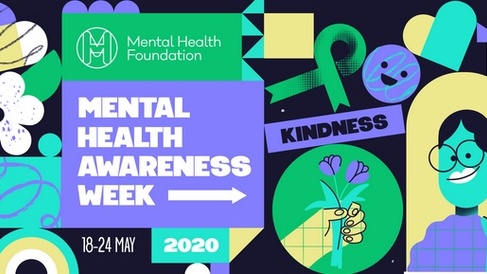Mental Health Awareness Week: Kindness

Mental Health Awareness Week, hosted by the Mental Health Foundation, will take place from 18-24 May 2020. The theme is kindness. Kindness is so important always, but never more so than in the current circumstances
KINDNESS
“When I step up on a stage, when I stand up to translate, when I go to teach my classes, when I go to direct a movie, I bring everyone who’s ever been kind to me with me – black, white, Asians, Spanish-speaking, native American, gay, straight – everybody. I say: ‘Come with me, I need you now.’”
- Maya Angelou[1]
Kindness: Giving and Receiving
As young children, we are taught before anything else to share, to wait our turn, to refrain from violence, and to apologize when we have hurt others’ feelings. Once these prosocial behaviours have been instilled in us, however, kindness can fall out of focus in adulthood, as the emphasis shifts to reliability, productivity, and the nurturing of a competitive spirit.
And yet, watching the news during a global crisis, the stories that move us most are the human interest stories, showing us the universal impulse to kindness, as exemplified by the mutual aid groups that have sprung up around the world, the £32m raised by Captain Tom Moore, and the hundreds of thousands who answered the call for NHS volunteers at the outset of the Covid-19 crisis.
We know, instinctively, how much it means to receive kindness. We can all remember times when we have been comforted, or had our spirits lifted even in a small way, by the kindness of another. Those remembered experiences can insulate us against suffering when times are difficult, and form the basis of our sense of self-competence.
But it goes both ways: being kind to others also increases our wellbeing and sense of satisfaction with our lives. Studies have found that we derive more pleasure from money spent on others than money spent on ourselves[2]; that acts of kindness performed for anyone from strangers to close friends and family over the course of a week lifts our mood[3]; and that the good feeling we get from being kind sets up a positive feedback loop that inspires us to do it more[4]. One of the ways we can remain buoyant during this crisis is to nurture our bonds with neighbours, friends, family, and community groups through looking after one another in whatever ways we can – be that shopping for someone who is self isolating, or checking in with a friend who is living alone. Just letting someone know you are thinking of them can be a powerful act of kindness.
Kindness to Ourselves
Recalling how it feels to be kind to others, or to be treated kindly, can also help us cultivate an attitude of compassion towards ourselves. It is a common misconception that being our own harshest critics is the best way to improve our performance, or to instil the discipline we need to succeed. But, as studies have shown[5], we are more resilient, more able to soothe ourselves in stressful situations, and better equipped to ‘bounce back’ after adverse experiences if we are able to accept our limitations and imperfections, comfort ourselves in our disappointment, and re-commit to our projects with renewed energy.
Whatever our situations right now, we are all dealing with enormous change and upheaval. Things are being expected of us that we never anticipated having to do. We may be struggling with the ‘brain fog’ of chronic stress that arises from prolonged loneliness, or worry, or an overload of responsibilities. We may be frightened, or grieving. Increasing our stress levels with self-criticism will not make anything better, but extending ourselves the same kindness we do to others may lighten our load.
Kindness Online
With face-to-face interactions few and far between, we’re increasingly turning to the Internet for support and connection. But when we are feeling anxious, angry or fearful, it is easy to take those feelings out on people online; we can forget that there are real people behind the user names and avatars. It was only 3 months ago, in February 2020, that #BeKind was trending on Twitter, a reminder of the tragic consequences of media bullying. The need to be kind is as strong as ever now, when the way forward feels uncertain and society seems divided in so many ways – the isolated and the overcrowded, the furloughed and the working, the people at high or low risk in terms of health. Approaching one another with the desire to understand and befriend, rather than attack or defend, will make our virtual world more comforting for everyone, at a time when we are relying on it for so much.
Resources
Crisis support:
https://www.nationaldahelpline.org.uk/
Opportunities for kindness:
https://covidmutualaid.org/local-groups/
https://www.mentalhealth.org.uk/coronavirus/random-acts-kindness
Self-compassion resources:
https://www.cci.health.wa.gov.au/Resources/Looking-After-Yourself/Self-Compassion
[1] Angelou, M. (2011) Interviewed by Oprah Winfrey in Oprah’s Master Class.
[2] Dunn, E.W, Aknin, L.B & Norton, M.I. 2008. Spending Money on Others Promotes Happiness. Science. 319(5870), pp. 1687-1688.
[3] Rowland, L & Scott Curry, O (2019) A Range of Kindness Activities Boost Happiness, The Journal of Social Psychology, 159:3, 340-343, DOI: 10.1080/00224545.2018.1469461
[4] Layous, et al (2017) What Triggers Prosocial Effort? A positive feedback loop between positive activities, kindness, and well-being, The Journal of Positive Psychology, 12:4, 385-398, DOI: 10.1080/17439760.2016.1198924
[5] Neff. K.D, et al (2005) Self-Compassion, Achievement Goals, and Coping with Academic Failure, Self and Identity, 4:3, 263-287, DOI: 10.1080/13576500444000317
